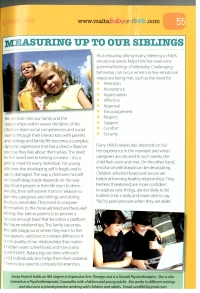
We are born into our family and the relationships within weave the fabric of life. Children learn social competencies and social norms through their interactions with parents and siblings and family life becomes a complex, dynamic experience that has a direct influence on how they feel about themselves. The need to feel loved and to belong is innate – it is a primal need for every individual. For young children, the developing self is fragile and is easily damaged. The way a child sees himself or herself deep inside depends on the way significant people in their life react to them. Initially, their self-esteem forms in relation to parents, caregivers and siblings and sibling rivalry is inevitable. They tend to compare themselves to the more admired and favoured sibling. Our role as parents is to provide a 'secure enough base' that becomes a platform for future relationships. The family becomes the safe playground where they learn to feel competent, valid and to tolerate difference. It is the quality of our relationships that matter. Children want to feel loved and love is also spelt T-I-M-E. Balancing out time with each child individually also helps them feel validated. There is less need to compete for attention, thus reducing sibling rivalry. Meeting a child's emotional needs helps him/her overcome potential feelings of inferiority. Challenging behaviour can occur when too few emotional needs are being met, such as the need for
• Attention
• Acceptance
• Appreciation
• Affection
• Approval
• Encouragement
• Respect
• Support
• Comfort
• Security
Every child's needs also depends on his/her experience in the moment and when caregivers are attuned to such needs, the child feels seen and met. On the other hand, emotional withdrawal can be devastating. Children who feel loved and secure are better at forming healthy relationships. They feel less threatened, are more confident to explore new things, are less likely to be bullied or be a bully and more able to say "No" to peer-pressure when they are older.
Anna Fenech holds an MA degree in Expressive Arts Therapy and is a Gestalt Psychotherapist. She is also trained as a Psychotherapeutic Counsellor with children and young adults. She works in different settings and also runs a private practice working with children and adults.
